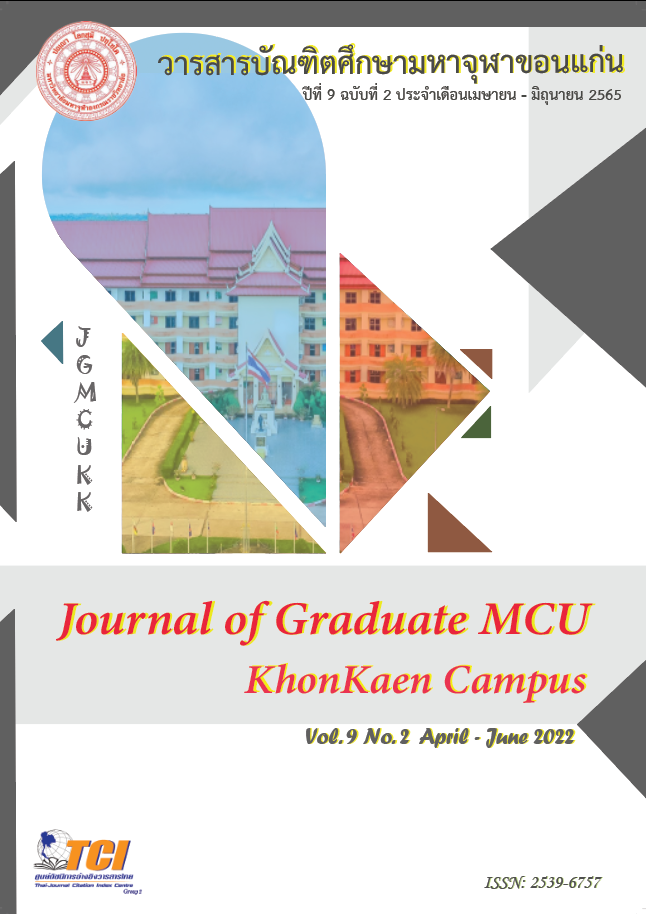Buddhist Ethics and Development Wisdom Buddhist Ethics and Development Wisdom
Main Article Content
Abstract
Buddhist ethics uses three principles to develop wisdom as 1. Physical development is an organic development within the body is the eye, ear, nose, tongue, body and mind, which is used for connection or is connected to the outside world, including a sound, smell, taste, touch, emotion, mind awareness open the channels associated with the physical environment, and all natural. Physical development, it is organic the practice is an organic wary, so it is the strength of the canon to support mental energy security and a way to grow towards the highest wisdom 2. Canon development is the Self-training which called for training or practice in the conduct highly, or training to conduct physical, verbal order to support not persecuted. Do not destroy themselves and others as the basis of training the mind and passion is light crude down. With control wary as a basis to develop their own lives to be ready to support a charity fair at all. Especially is the basis for the development of the mind to a higher morality. And 3. Mental development is the spiritual development or contemplative development in a threefold training by focusing on the development wisdom of mental dysfunction include incorporating mindfulness and right concentration. Access to trained mental or development wisdom, and strengthen their well-established firm control with a high concentration are encouraged to mental calm, cheerful, happy, innocent, free from interference, or sad In conditions suitable for most applications. In particular, the profound wisdom, and corresponded with reality.
Article Details

This work is licensed under a Creative Commons Attribution-NonCommercial-NoDerivatives 4.0 International License.
References
_______. (2533). พระอุปติสสเถระ. วิมุตติมรรค. กรุงเทพฯ: ศยาม.
มหาจุฬาลงกรณราชวิทยาลัย. (2539). พระไตรปิฎกภาษาไทย. ฉบับมหาจุฬาลงกรณราชวิทยาลัย. กรุงเทพฯ: มหาจุฬาลงกรราชวิทยาลัย.
เธียรชัย เอี่ยมวรเมธ. (2540). พจนานุกรมไทย ฉบับอธิบาย 2 ภาษา. กรุงเทพฯ: อักษรพิทยา.
นงลักษณ์ วิรัชชัย และ รุ่งนภา ตั้งจิตราเจริญกุล. (2554). การวิเคราะห์การเปลี่ยนแปลงคุณธรรจริยธรรม ของคนไทย. กรุงเทพฯ: หจก.ครีเอทิฟโทน.
บุญมี แท่นแก้ว และคณะ. (2532). จริยศาสตร์. กรุงเทพฯ: วิทยาลัยครูสมเด็จเจ้าพยา.
พระธรรมปิฎก (ป.อ.ปยุตฺโต). (2542). พุทธธรรม. กรุงเทพฯ: โรงพิมพ์มหาจุฬาลงกรณราชวิทยาลัย.
พระพรหมคุณาภรณ์ (ป.อ.ปยุตฺโต). (2552). พุทธธรรมฉบับปรับปรุงและขยายความ. กรุงเทพฯ: มหาจุฬาลงกรณราชวิทยาลัย.
พระไพศาล วิสาโล. (2541). พุทธธรรมกับการพัฒนาสังคม. กรุงเทพฯ: มูลนิธิโกมลคีมทอง.
เพ็ญแข บัวภา. (2554). พุทธิปัญญาในโกอานและภาพปริศนาธรรมเพื่อสังคมแห่งการตื่นรู้. กรุงเทพฯ: บริษัท 21 เซ็นจูรี่ จำกัด.
ศูนย์ส่งเสริมและพัฒนาแผ่นดินเชิงคุณธรรม. (2551). การวิจัยและพัฒนาตัวบ่งชี้คุณธรรมจริยธรรม. กรุงเทพฯ: บริษัท พริกหวานกราฟฟิค จำกัด.
Murray Thomas. (1990). The Encyclopedia of Human Development and Education Theory, Research, and Studies. United State of America: Bpcc Wheatons Ltd.

